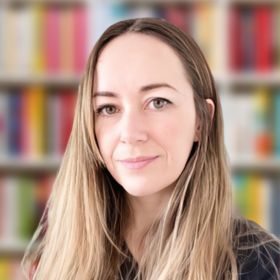I am now a terrifying five months into maternity leave, and this month in my regular blog, I’ll be thinking about making the decision to start – or to expand – a family when working in academia.
For some reason, I never really spoke to other people about having children. Given the personal nature of my blogs, it may surprise you to know that I’m a pretty private person; I keep my cards close to my chest. So close, in fact, that some friends have literally learned I’ve had a baby through these blogs, for which I can only apologise! The week after I got married, a friend of mine asked when we were going to have a baby, and I was frankly horrified. Previously to that, no one had really enquired about my reproductive aims. At the time, during the Covid lockdown, I was furloughed from my work in the Church of England, so it wasn’t really on the agenda. I am very close to my sister, but the day I told her I was pregnant (or, rather, refused a glass of birthday champagne and ordered a decaf coffee in her presence) even she admitted that she hadn’t really known where I stood on the whole children thing, as I hadn’t ever wanted to discuss it. Now, though, it seems like having a baby has opened the floodgates for people to have those conversations with me, whether I like it or not!
I was having lunch with a girl I only vaguely know this week, and she asked me whether my partner and I are planning on having a second child. I’m barely recovered from the first one, to be honest, but now that I’ve demonstrated that having a baby is something I am open to, evidently there is interest in how many I might consider producing. When confronted with the question of having another child, though, I didn’t know how to answer. There are just so many issues to consider.
Having a baby is never straightforward. I consider it such a privilege that I have been blessed with a child, when I know that wanting a baby and actually having a baby are two very different things. We are incredibly fortunate that becoming pregnant was easy, not requiring additional intervention, which isn’t the case for everyone. We also happen to have lucked out with a baby who very rarely cries, sleeps like an absolute champion and isn’t particularly fussy. He makes it so easy to imagine a life with a second – based upon the assumption that any subsequent offspring would be identical in temperament, which I’m confident they wouldn’t be. However, having chosen the line of work that I have, the reality is I just don’t know whether it would be feasible to expand our family.

According to a 2019 report by the Wellcome Trust, 78% of researchers felt that a career in academia negatively impacts their ability to have a family due to factors like short-term contracts and lack of financial stability.
If you’ve been following this blog series, you may also have caught the podcast that I recorded recently with Dr Laura Prato and Dr Aisling McFall – do give it a listen, if you haven’t. While preparing for the recording, one of the things I wanted to ask about was whether their choice of career had in any way impacted their decision to have a child. I was somewhat dismayed, but not altogether surprised, to discover that there did seem to be a shared perspective that working in academia absolutely makes it more difficult to start or expand a family. For all of us, having a family required additional planning or additional sacrifice. While friends in other fields might simply decide that the time was right, for those of us on short, fixed-term contracts, it isn’t so simple. The time might be right for one’s family, but if you’re coming to the end of a contract, having a baby might mean not having a job to come back to, relying on minimal income during parental leave, or not being entitled to enhanced maternity provision.
In my own situation, I have started a family as a PhD student, and am extremely grateful to my funder for their maternity provision making that possible. On a stipend, however, providing for one child will be a stretch, and a second would be impossible – particularly when (as I’ve previously mentioned) as a postgraduate student in the UK you are not eligible for the financial assistance with childcare you would be entitled to as a working parent or indeed as an undergrad. If I were to have a second child, it would need to be after my PhD, when I’m established in a new role, or a postdoctoral fellowship. By that time, I will be in my 40s. May the odds be ever in my favour. Perhaps one and done it is.
I hate to be overly political, but surely we can do better here? Talking about the insecurity of contracts in academia is hardly new, but it frustrates me to think about all of the great, female minds who will be lost to other sectors that can offer them that elusive permanent contract. Or to think about the people making really hard choices for their families, because their career makes it difficult to consider taking maternity or indeed adoption leave. Choosing between having a family and furthering your career obviously isn’t unique to academia – in fact, I was reading an article on BBC Sport this week about starting a family being something of a taboo in women’s football, which I found really interesting. But within academia this seems to be such an avoidable situation. I would love to see positive change in this area.
Going back to the question I was asked this week: whether I would have a second. What did I answer? Well, I shrugged. And I said that I’m so lucky to have the one I have, that I don’t know what will happen because work makes things a little complicated, that I love having siblings that I’m close to and probably would want that for him, but that he will always be enough.

Emily Spencer
Author
Emily Spencer is a PhD Student at University College London looking at improving how GPs communicate with people with dementia and their family carers about their future care. Emily previous had a 5 year career break to pursue a career as a musician, and has previously undertaken research on improving the care people with dementia receive from their GP practice, as well as end-of-life and palliative care provision in the community. Emily is also a new mum and will be writing about her experiences navigating motherhood and a research career.

 Print This Post
Print This Post
